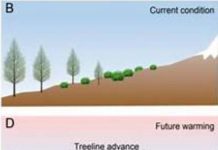By Andleeb Khan
ISLAMABAD, Aug 17 (APP): Pakistan, one of the most affected countries by climate change, faces severe challenges due to escalating heatwaves and widespread deforestation. Although numerous tree planting campaigns are active across the country, these efforts are insufficient to address the scale of the crisis.
Tree planting is not just a strategy but a crucial tool in managing climate challenges, improving public health, and protecting agriculture and the environment. As highlighted by the Global Climate Risk Index, Pakistan’s vulnerability to climate threats underscores the urgent need for intensified and consistent tree plantation initiatives.
According to the Global Forest Watch, Pakistan had 648,000 hectares of tree cover in 2010, accounting for 0.74% of its land area. However, by 2023, the country lost 148 hectares of tree cover, releasing 60.2 kilotons of CO2. Since 2001, Pakistan has lost 9,940 hectares of tree cover, representing a 1% decrease since 2000, and emitted 2.88 million tons of CO2 equivalent. Deforestation, driven largely by human activities, has been a major issue, with 4.1% of tree cover loss occurring in areas affected by such activities.
In 2024, Pakistan has reported 1,534 high-confidence VIIRS fire alerts, a significant increase compared to previous years. The highest number of fire alerts recorded in a year was 1,869 in 2018. From July 5, 2021, to July 1, 2024, there have been 59,835 VIIRS fire alerts. Forest fires, primarily caused by human negligence, are the leading driver of deforestation in Pakistan.
Recent fire incidents in June, particularly in Margalla Hills National Park—which spans 12,605 hectares and is managed by the Capital Development Authority (CDA) and Islamabad Wildlife Management Board (IWMB)—highlight the severity of the situation. These fires, often exacerbated by heatwaves, have become increasingly frequent and intense due to climate change and human negligence.
Addressing these challenges requires concerted efforts. Public awareness campaigns and more educational seminars are essential to emphasize the importance of tree planting and the need to avoid practices that could trigger fires, such as cooking and smoking in forested areas.
Naseer Memon, a renowned climate change and natural disaster expert, stresses that sustainable plantation involves choosing the right species. Ecologically harmful and invasive species should be avoided, and post-plantation care must not be overlooked in the pursuit of high planting targets.
Dr. Ghulam Raza Bhatti, a botanist at the Botanical Garden, Biodiversity & Conservation, notes that Pakistan’s diverse terrain—from the coast to the K2 Mountains—supports a variety of ecological zones and forest types. This diversity necessitates a variety of vegetation suited to different ecological zones.
In Islamabad, the city’s undulating landscape offers several areas suitable for tree planting, including avenues, major and emerging arteries, parks, green belts, residential areas, educational institutions, and government offices. Urban tree cover is crucial for enhancing the city’s environmental quality.
Dr. Ghulam Raza highlighted the need to seek expert advice before planting saplings, as not all trees are suited to every region or ecosystem. Choosing the appropriate species for the specific environmental conditions is essential for ensuring successful growth and maximizing the environmental benefits.
Additionally, Pakistan is grappling with a severe energy crisis, with rising power consumption putting immense pressure on the national grid. To address this, promoting extensive tree plantation—especially of fast-growing species suitable for biomass energy—can serve as a pivotal strategy. By diversifying its energy sources and reducing reliance on fossil fuels, Pakistan can move towards a more sustainable energy future.
In a nutshell, prioritizing large-scale tree plantation is more than just a conservation initiative; it’s a holistic approach to tackling Pakistan’s environmental, social, and economic issues. This strategy not only helps in disaster resilience and public health improvement but also contributes to energy conservation and sustainable development. By adopting this approach, Pakistan can forge a path towards a greener, healthier, and more prosperous future for all its citizens.

















